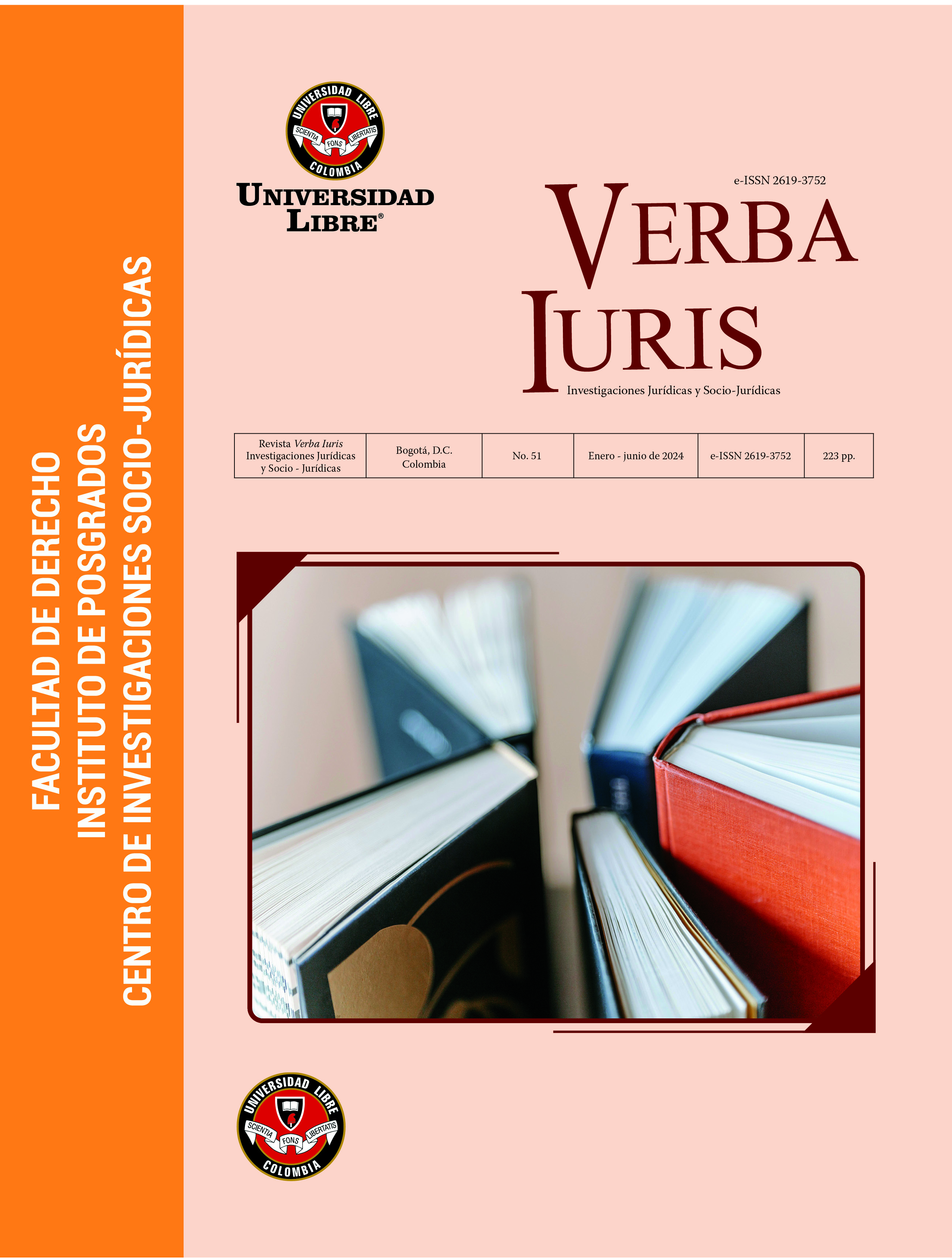Violación de principios constitucionales por la inaplicación del precedente jurisprudencial: una mirada desde la aplicación en el tiempo de la teoría del precedente
DOI:
https://doi.org/10.18041/0121-3474/verbaiuris.51.11495Palabras clave:
Control de constitucionalidad; Precedente jurisprudencial, Seguridad jurídica; Antiformalismo jurídico, jurisprudenciaResumen
El gobierno del juez, un sistema jurídico que aparece como respuesta a la necesidad de la sociedad de ofrecer respuestas a las diferentes problemáticas. Tal necesidad de antaño se materializó en la teoría del precedente jurisprudencial desde los “reports” (colecciones de jurisprudencia – sistema inglés) o desde el “judicial review” (sistema estadounidense), la que se asumió en Colombia bajo las particularidades de un sistema propio. Si bien es cierto que se considera un acierto haber asumido el sistema de precedentes en el sistema jurídico local, también lo es que en la práctica el órgano judicial se aparta en cierta medida de la técnica propia del sistema de precedentes jurisprudenciales, especialmente por los efectos de las decisiones y de la jurisprudencia en el tiempo; lo cual a juicio de este tesista puede llegar a generar, según sean los efectos que se dan y el tipo de decisión por adoptar, la violación de principios constitucionales como lo son: legalidad, seguridad jurídica, igualdad y confianza legítima. En tal virtud, se genera una propuesta a modo de conclusión de aplicar prospectivamente el precedente jurisprudencial, de tal forma que se optimicen los mandatos constitucionales en las decisiones del órgano judicial
El objetivo es identificar los valores y principios constitucionales que pueden transgredirse por la aplicación antitécnica, o en su defecto, inaplicación del precedente jurisprudencial en el sistema colombiano y como se dijo, generar una propuesta para superar tales dificultades. En el desarrollo del trabajo se acude a fuentes bibliográficas primarias y secundarias, además de la verificación y análisis de la jurisprudencia que pueda contener elementos de interés para estas líneas.
Finalmente se logra identificar que la Jurisprudencia como fin del derecho pretende la solución justa de los conflictos sociales, por tal motivo la aplicación antitécnica del sistema de precedentes jurisprudenciales conlleva a un riesgo de la seguridad jurídica de los administrados, por cuanto pudiera decidirse un caso concreto con normas diferentes y desfavorables al administrado, de cuando se presentó la demanda.
Descargas
Referencias
Aarnio, A. (1991). Lo racional como razonable. Madrid: Centro de Estudios Constitucionales.
Agudelo, C. A. (2014). La Democracia de los jueces: La rama menos peligrosa como poder prodemocrático en la práctica constitucional. Bogotá: Leyer.
Bernal, P. C. (2008). El Precedente en Colombia. Derecho del Estado No. 21, 83-84.
Bingham, T. (2018). El Estado de Derecho. México: Tirant.
Cuello, C. M. (2012). La Obligatoriedad del Predenete judicial frente a las autoridades administrativas colombianas. Revista - Vis Iuris, 95.
Deik Acostamadiedo, C. (2017). El Precedente Contencioso Administrativo: Teoría Local para Determinar y Aplicar de Manera Racional los Precedentes de Unificación del Consejo de Estado. Bogotá: Externado.
Dicey A.V. (1945). An introduction to the study of the law of the constitution. Macmillan.
Diek, C. (2018). El precedente contencioso administrativo: Teoría local para determinar y aplicar de manera racional los precedentes de unificación del Consejo de Estado. Universidad Externado de Colombia.
Gèny, F. (2000). Método de Interpretación y fuentes de derecho Privado positivo. Granada: Comares.
Góngora, G. (1997). Introducción al estudio del juicio de amparo. Ciudad de México
Harris, R. C. (2012). El precedente en el derecho inglés. Madrid: Marcial Pons.
Jaramillo, J. T. (2012). El precedente judicial en Colombia: papel valor asignados a la jurisprudencia . Bogotá : Ibañez.
López Medina, D. F. (2006). El Derecho de los Jueces. Bogotá: Legis.
Matteucci, N. (1988). Organización del Poder y Libertad: Historia del constitucionalismo moderno. Madrid: Trotta.
Medina López, D. E. (2006). Módulo de Interpretación Constitucional. Bogotá: Escuela Judicial Rodrigo Lara Bonilla.
Rousseau, D. (1999). Droit du contentiex constitutionnel. París: Montchetien.
Rupert Cross, J. H. (2012). El precedente en el derecho inglés. Madrid: Marcial Pons.
Sodero, E. (2004). Sobre el Cambio de Precedente. Isonomía. Revista de Teoría y Filosofía del Derecho, 217-251.
SENTENCIAS
CORTES INTERNACIONALES
Corte Interamericana de Derechos humanos: Sentencia del Caso Narciso Palacios vs Argentina – 29 de septiembre de 1999.
Corte suprema de Estados Unidos: Marbury Vs Madison. (1803).
Corte suprema de Estados Unidos: Weymouth vs Windsor Police Dep, 4550 CRB 1-02-7 (CONNECTICUT WORKERS COMP. DECISIONS 2003).
CONSEJO DE ESTADO
Consejo de Estado Sentencia del 4 de septiembre Exp. 57279 (Consejo de Estado 2017).
Consejo de Estado Sentencia SU 014 CE - S2 2019, 680012333000201500569-01 (Consejo de Estado 25 de abril de 2019).
CORTE CONSTITUCIONAL
Corte Constitucional: Sentencia C – 836 del 2001
Corte Constitucional: Sentencia de Unificación 406 de 2016
Corte Constitucional: Sentencia C - 529 de 1994.
Corte Constitucional: Sentencia C 131 de 2004.
Corte Constitucional: Sentencia C 816 de 2011.
Corte Constitucional: Sentencia C-549 de 1993.
Corte Constitucional: Sentencia SU 354 de 2017.
Corte Constitucional: Sentencia SU 406 del 2016.
Corte Constitucional: Sentencia T 123 de 1995.
Corte Constitucional: Sentencia T 502 del 2002.
CORTE SUPREMA DE JUSTICIA
Corte Suprema de Justicia sentencia del 8 de noviembre , 47608 (Corte Suprema de Justicia 2017).


